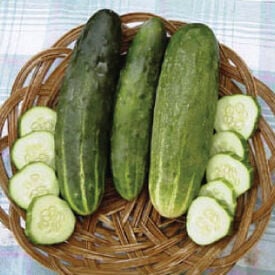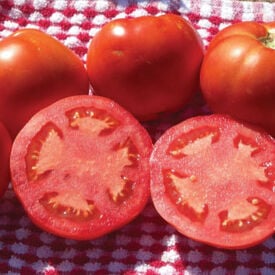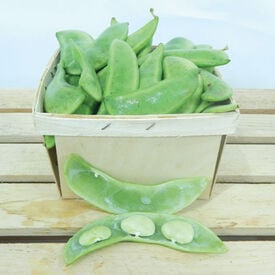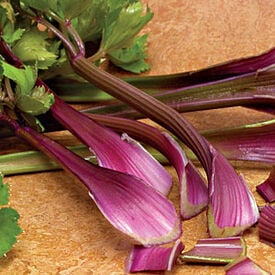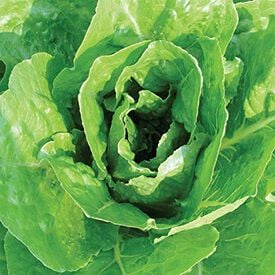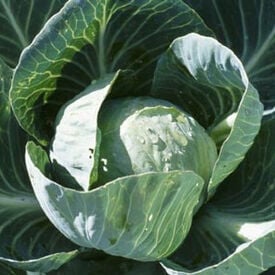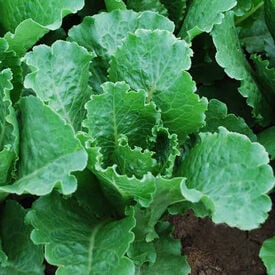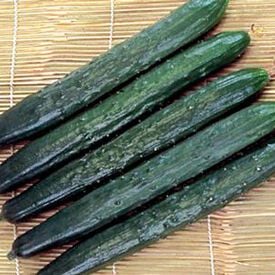The Ashley cucumber is great for hot Southern weather and has great downy mildew resistance! This variety was released by Clemson Agricultural in 1956 and produces very productive vines that produce 8", dark green cucumbers. Ashley is known to be a very good slicing variety!
The Floradade Tomato is a delicious, bright red variety that has a great ability to withstand heat and produce high yields! This variety was introduced by the University of Florida in 1976. This tomato plant produces smooth, 5-7 ounces sized tomatoes with slightly deep globes that have red with green shoulders.
Fordhook 242 beans are a popular variety of lima beans known for their smooth texture and rich, buttery flavor. These beans are characterized by their large, flat, greenish seeds that mature to a creamy, pale yellow when harvested. The Fordhook 242 variety is prized for its resilience and productivity, thriving in both home gardens and larger agricultural settings. With a growing season of about 70 to 80 days, these beans are often used in a wide range of culinary dishes, from soups and stews to side dishes and casseroles. Their versatility, coupled with their excellent taste, makes them a favorite among gardeners and chefs alike.
Tall Utah celery, developed in the early 20th century in Utah, is renowned for its tall, sturdy stalks and exceptional flavor. This variety features vibrant green, crisp stalks that can reach heights of 18-36 inches, making it a standout in gardens. The taste is mild and slightly sweet, perfect for fresh eating or cooking in a variety of dishes. Harvesting typically occurs 85-100 days after planting, when the stalks are firm and well-developed; gardeners can choose to cut the entire plant or selectively harvest individual stalks as needed. Tall Utah celery thrives in cool climates and requires consistent moisture, making it a favorite for both home growers and commercial producers.
The large, red stalks of the Giant Red celery have a wonder flavor, some prefer it over green stalks! The Giant Red celery is a hidden gem. This variety is by far the best tasting celery you can grow! The yellow-pink hearts of the Giant Red are great in salads or soup and it grows great throughout the United States.
Often called Early Coreless, this heirloom carrot is prized for its excellent storage ability and wide adaptability in the garden. It produces smooth, cylindrical roots about 7 inches long with rounded ends and vibrant red-orange flesh that is fine-textured and nearly free of a core. The flavor is notably sweet, crisp, and clean, making it enjoyable fresh or cooked. Harvested young, it works beautifully as a baby carrot, and it also performs exceptionally well for freezing and juicing. With origins dating back to the 1850s, this classic variety was developed in France by the renowned seed firm Vilmorin-Andrieux and remains a favorite for its quality and reliability.
The Giant Caesar Lettuce is an amazing bright green looseleaf romaine type that has a buttery sweet flavor similar to a butterhead. This variety's large leaves are easy to pick without any tearing or bruising. The Giant Caesar is heat resistant and will hold its color and flavor well.
The All Seasons Cabbage is a very heat resistant cabbage that is resistant to yellowing and will offer a nice flavor in any dish. This cabbage produces fine heads that are about 10-11" across and average about 11-14 pounds.
Jackson Wonder bush lima beans are a treasured heirloom variety with deep roots in Southern agriculture, particularly celebrated in the early 20th century. Known for their compact, bush-type growth habit, these beans typically reach heights of 18 to 24 inches, making them ideal for small gardens and easy to manage without support. The beans are characterized by their creamy white color, often with subtle greenish hues, and they grow in smooth, straight pods. Renowned for their rich, buttery flavor and creamy texture, Jackson Wonder beans are perfect for soups, stews, and as a delightful side dish. Harvesting typically occurs in mid to late summer when the pods are plump and the beans are fully developed but still tender. These plants are vigorous and produce a high yield, thriving in well-drained soil with ample sunlight, while also exhibiting resilience against common pests and diseases. With their delicious taste and reliable productivity, Jackson Wonder bush lima beans remain a favorite among gardeners and culinary enthusiasts alike.
The Danver 126 is a durable, multipurpose carrot that produces high yields. Danver 126 was bred by the Eastern States Farmers Exchange from selections of heat resistant strains of carrots. This carrot is improved for better interior color, smoother skin, better uniformity and better yield. Released in 1947. Excellent for home gardens and markets.
The Crisp Mint Lettuce is a big romaine variety with mint green-colored leaves that will be sure to stand out in any home garden! This bold lettuce is only mint in color, not taste. However, its sweet and crunchy leaves will be a favorite addition to any salad or sandwich. Crisp Mint's heads will reach 10 inches tall making it perfect for a container garden!
The Tasty Green cucumber is a burpless cucumber that is crisp and juicy. This hybrid is a deep green cucumber with long white spines. The Tasty Green is a great cucumber for hot and humid climates. The long 12" inch burpless cucumbers have an excellent, bitter free flavor. This variety is an excellent cucumber for greenhouse growing as it produces high yields.
